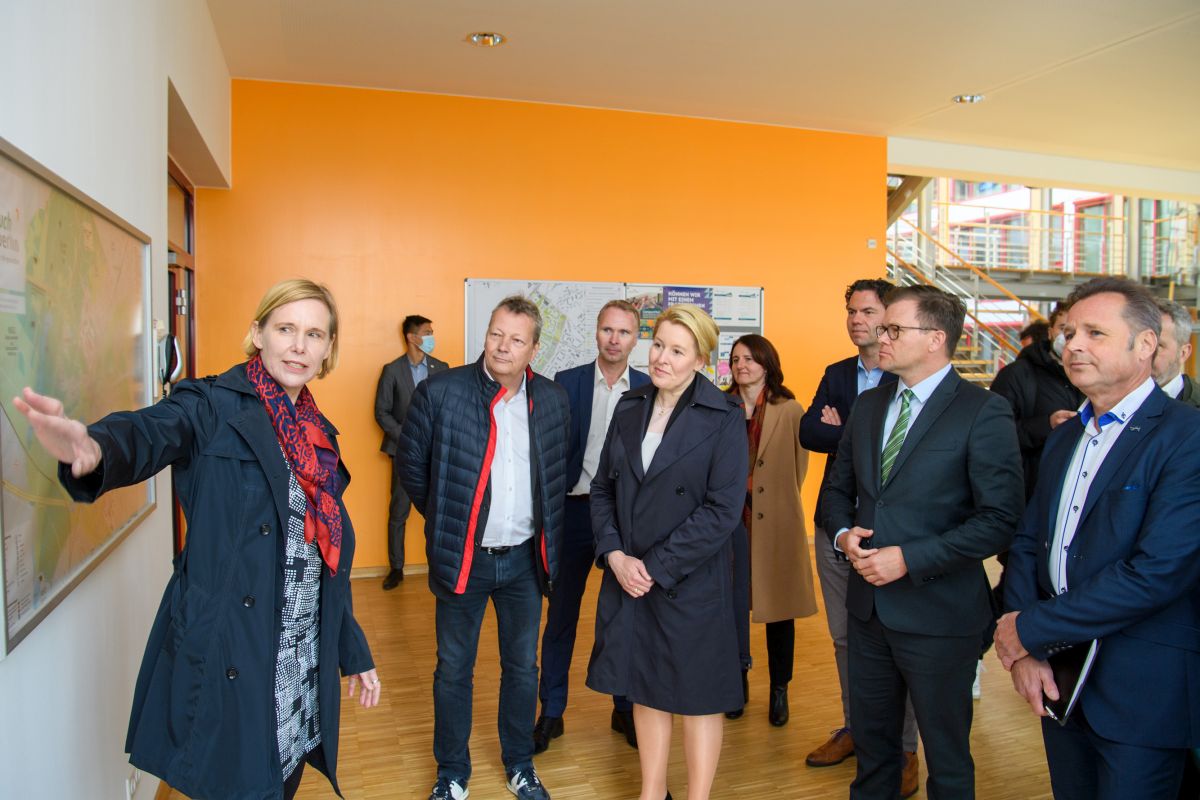Where science turns into business
25.04.2022 / On April 25, 2022, Federal Commissioner for East Germany, Minister of State Carsten Schneider, and Governing Mayor of Berlin Franziska Giffey visited Campus Berlin-Buch to see how the “Zukunftsort” (place of the future) is developing.

Following the invitation of Campus Berlin-Buch, the Federal Commissioner for Eastern Germany, Minister of State Carsten Schneider, and Berlin Mayor Franziska Giffey, visited the science and technology hub on April 25th, 2022. They were accompanied by Pankow District Mayor Sören Benn. On campus, the guests gained insights into the BiotechPark Berlin-Buch.
The research campus is one of Berlin's eleven “Zukunftsorte“ (places of the future), attracting excellent scientists from all over the world. Berlin-Buch stands for the future of medicine. For decades, research and healing, invention and therapy have been combined at the health location Berlin-Buch. Established companies work alongside life science start-ups, and teams of doctors and researchers cooperate closely with each other.
Internationally renowned research institutions such as the Max Delbrück Center for Molecular Medicine in the Helmholtz Association (MDC) and the Leibniz-Forschungsinstitut für Molekulare Pharmakologie (FMP), the Charité – Universitätsmedizin Belrin, the Berlin Institute of Health in the Charité (BIH) as well as biotechnology companies and clinics form a network. Building on the first spin-offs at the beginning of the 1990s, the campus is now one of the largest biotech parks in Europe. With a clear focus on biomedicine, it represents the entire value chain from knowledge to development to the production of marketable innovations and has outstanding growth potential.
The investments are worthwhile
"Since 1992, more than 600 million Euros have been invested in research and biotech infrastructure on the campus by the EU, the federal government and the state. And on our campus it is evident that these investments are worthwhile," said Dr. Christina Quensel, Managing Director of Campus Berlin-Buch GmbH. "By closely combining basic and clinical research, state-of-the-art technology platforms and with the goal of bringing biomedical findings into application, science is turning into business in Berlin-Buch."
A visible sign of the continuing growth is the new construction of the “BerlinBioCube” start-up center in the BiotechPark. The "BerlinBioCube" will open in 2023 and offer 8,000 square meters of space for start-ups in biotechnology, medical technology and related fields. When it is completed next year, around 30 biotech start-ups will be able to work in state-of-the-art laboratories and offices and start their business operations. Dr. Ulrich Scheller, Managing Director of Campus Berlin-Buch GmbH, and Dr. Quensel explained plans for the expansion of the campus, the extension of the biotech park to neighboring areas in the city and for the increased establishment of biotech companies.
During their campus tour, the politicians met with researchers and successful entrepreneurs. They visited the laboratories of T-knife, one of the most successful start-ups in the biotech scene, whose technology for novel immune therapies against cancer is based on decades of basic research at the Max Delbrück Center for Molecular Medicine.
One of the world’s best
In a discussion at the corporate headquarters of Eckert & Ziegler Strahlen- und Medizintechnik AG, the guests discussed current issues of business development in technology and start-up centers, questions and best-practice examples of value-creating networking between research and business, the expansion of the regional transport infrastructure and the coordinated development of commercial and residential building potential areas at the future location of Berlin-Buch with representatives from companies and research institutions on the campus.
"The Berlin-Buch campus with its numerous players from science and the health industry is an example of successful transformation into a modern technology hub for clinical research, molecular medicine and molecular pharmacology. Buch proves how targeted innovation management leads to success and global networking when it is supported by active settlement and funding policies that involve business and science and that think transport and living and working together. Thank you to all our hosts for inspiring impressions," said Franziska Giffey.
Minister of State Carsten Schneider also thanked the campus actors. "Today, we gained highly exciting insights into the biotech sector in Berlin-Buch. Innovative research and work is being done here. This makes the Berlin-Buch campus one of the world's best," explained Schneider. "With the research funding from the federal government, we are creating long-term structures.
